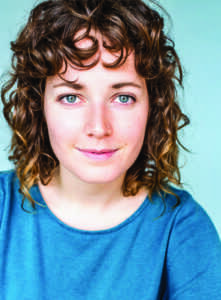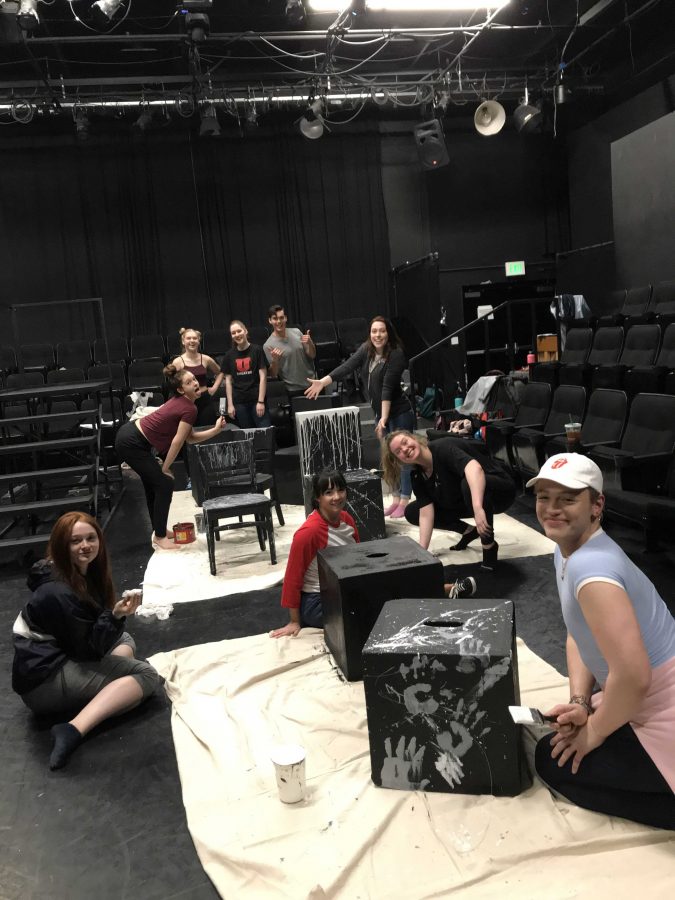This article was originally published in print on April 22.
It’s that time of year when seniors all around campus are sending out graduation announcements, completing final essays and studying for what might be the last finals that they’ll ever take. In the midst of all this chaos, fine arts students do things a little differently. As a fine arts senior, everyone puts together a senior show. It can be a showcase of work that they’ve done during their time at the University of Utah, a play or recital of their choice, direction and performance to showcase their growing talent. Here’s a look inside the planning and producing process for students in the U’s theater program.
Individual Projects

Savannah Moffat is a senior in the Actor Training Program and has decided to tackle writing a one-woman show. “I knew from the beginning that I wanted to do a one-woman show,” Moffat said. “I initially looked for something that was already written, but I couldn’t find anything that I was really excited about, and then one of my friends mentioned that she had heard of a woman who did all of the female lines of a Shakespeare play as a one-woman show. I was really excited about that idea and then the rest of the concept came about in bits and pieces as I looked for source material.”
Other ATP seniors, such as Emily Nash, found their plays and tweaked or adapted scripts to their purpose. Nash explained her inspiration, and said, “I stumbled across an anthology of missionary plays from the 1930s at Eborn Books this past December, and on a whim decided I was going to do a post-colonial production of one of the plays as my senior project. One of the plays, ‘Kimino,’ became the seedling for what would eventually become the ‘Salvation Project.’”

Hannah Ensign, another ATP senior, will be performing “Every Brilliant Thing” by Duncan Macmillan. “I think this is a remarkable and touching story,” Ensign said. “It was the first play I read when I was searching for material for my senior project, and even though I read other plays after that, I just kept coming back to it.”
Every senior show is unique to the individual, whether it is newly composed or found material. They put a lot of their heart into the work, along with all their skills and training from the U.
“In traditional performance, the creative team does a lot of investigative work to decode what has been written by the playwright and to make sense of it for this particular production. In a project like mine where I was working without a set script, I’ve had a lot of freedom but also a lot of pressure to construct, direct and perform my own piece. It’s been a lot of scrambling and fixating, but regardless of how the final presentation is received, it’ll be my work, through and through, and that feels like enough of a reward to justify the headache,” Ensign said.

Moffat concurs with the pressure that a senior show adds to the already hectic time of pre-graduation. “I’ve never done a piece of this scale on my own before, so I’m excited for everyone to see me do an original piece,” Moffat said, adding that she is “excited and terrified” to perform her piece. “The hardest part for me for sure has been time management.” Moffat also said. Nash expands on this problem of time, saying she struggled with “holding [her]self accountable to what is actually possible in the amount of time, space, cast and budget [she] currently [has].”
Creating a senior show is a chance for young artists to explore their ability in a supported environment. Each show is viewed by faculty advisors before it opens and the variety in content is a treat for up and coming students as well. Nash’s favorite part of the journey has been “finding the moments and events that really click. That indescribable sensation when you’ve finally found ‘it.’” Moffat loves finding new dynamics in playing the familiar character of Juliet. “I think she gets passed off as a young, naive, innocent girl, but I think she’s a lot more hardcore than people give her credit for.” Moffat said, “I would love to show people a version of Juliet that they aren’t expecting.”
Mostly, the seniors are excited to show their work to the community. All senior shows are open to the public and free to attend.
Group Cooperation
In the Musical Theatre Program, things are done a little differently. Seniors have the option to sing a final vocal jury or to put together a senior recital. Juries are 10 minutes long and should show a variety of range, including at least one classical piece (often sung in Italian, French or German) and a song from each major period in musical theater. Many seniors often sing a pop song as well. In lieu of a final jury, students can also put together a senior recital. Recitals can be one to three students and follow the same basic parameters of juries with a variety of song styles. They’re often 45 minutes to an hour. The students do have to rent the recital hall and pay the accompanist out of their own pocket, so recitals are more expensive and require more work with all of the planning involved.
In addition to these individual performances, the MTP seniors also do a senior show. “The senior show is a chance for our entire class to be involved in a show together which doesn’t necessarily happen in the other shows during the season,” said senior Amanda Smith. “We’re not ever guaranteed a chance to perform in the program, so this project allows us to have a full performance opportunity. More importantly, it’s a chance for our class to come together and share the progress we’ve made in the past four years of training.”
The senior show is entirely planned and run by the seniors. They divide up the work of getting show rights, costume and set design and managing the house. Juniors will often help with offstage changes and moving set pieces. The show is generally directed and cast by a theater professor, as all the seniors must be in the show. Furthermore, all the proceeds from each senior show go to funding the next year’s senior production. The show is a massive undertaking that the senior class works on for the entire year. Senior Barbara Camara said, “We started considering show options during our junior year. Even though there are so many great shows out there, it was really tricky finding one that would have the right roles for everyone in our class.” Smith also said, “It was a challenge because we have a class of mostly girls and two boys.”
Luckily Denny Berry, the head of the Musical Theatre Program, has connections in the larger theater world.
“We had a really cool opportunity when Frank Wildhorn, composer of shows like ‘The Scarlet Pimpernel,’ ‘Jekyll and Hyde’ and ‘Bonnie and Clyde,’ reached out to the head of our program wanting to collaborate and create a song cycle with his work,” Smith said. “That’s how ‘A Dangerous Game’ came about.”
While the opportunity to work with an influential composer’s work is a once-in-a-lifetime chance, it is not necessarily an easy process. “We didn’t have very much time to put this show together,” Smith said. “We only have class twice a week for three hours, so to basically write a new show and learn all of the music for it while also keeping up with our other classes was difficult to do in the time frame we were given.” This isn’t mentioning that they are all still planning senior recitals or juries and performing in U and Pioneer Theatre Company productions.
Soon, it will all be worth it. “My favorite part of any show I’m in is when we start doing runs of the whole show and see it really come together,” Smith said. “It’s been fun to see everything solidify and turn into a real show with the band, costumes, makeup and props.”
“A Dangerous Game” is a song cycle, which means it’s a series of songs strung together to form a loose plot. Frank Wildhorn writes vocally challenging music and his shows mostly lean towards darker content. Next year, the U’s theater department will be performing “Dracula,” which is written by Wildhorn.
To work with these pieces, the senior class really had to come together and work as a group, “The show is truly an ensemble piece and effort. None of us have names or any specific part. We’re an ensemble bringing the songs and the show to life,” Smith said.


